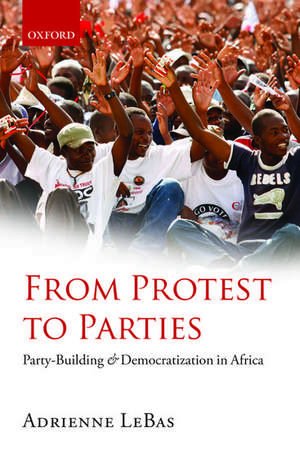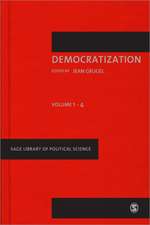From Protest to Parties: Party-Building and Democratization in Africa
Autor Adrienne LeBasen Limba Engleză Paperback – 23 mai 2013
| Toate formatele și edițiile | Preț | Express |
|---|---|---|
| Paperback (1) | 322.06 lei 31-37 zile | |
| OUP OXFORD – 23 mai 2013 | 322.06 lei 31-37 zile | |
| Hardback (1) | 761.10 lei 31-37 zile | |
| OUP OXFORD – 28 apr 2011 | 761.10 lei 31-37 zile |
Preț: 322.06 lei
Preț vechi: 371.95 lei
-13% Nou
Puncte Express: 483
Preț estimativ în valută:
61.63€ • 64.11$ • 50.88£
61.63€ • 64.11$ • 50.88£
Carte tipărită la comandă
Livrare economică 03-09 aprilie
Preluare comenzi: 021 569.72.76
Specificații
ISBN-13: 9780199673001
ISBN-10: 0199673004
Pagini: 316
Dimensiuni: 156 x 236 x 18 mm
Greutate: 0.48 kg
Editura: OUP OXFORD
Colecția OUP Oxford
Locul publicării:Oxford, United Kingdom
ISBN-10: 0199673004
Pagini: 316
Dimensiuni: 156 x 236 x 18 mm
Greutate: 0.48 kg
Editura: OUP OXFORD
Colecția OUP Oxford
Locul publicării:Oxford, United Kingdom
Recenzii
This book is a major contribution. Nearly all political scientists agree that strong parties are critical to achieving and sustaining democracy, but party-building in the developing world has proven far more difficult than many scholars anticipated. From Protest to Parties offers a new - and highly compelling - theory of why strong opposition parties emerge in some contexts but not others. Based on impressive field research in Kenya, Zambia, and Zimbabwe, the book shows that robust party organizations are often forged during periods of intense polarization and conflict. This book is helping to reshape scholarly debates about party formation. It should be required reading for anyone interested in parties and party organization in the developing world.
The intricate exploration of the origins and outcomes of political party development in From Protest to Parties shows that conflict is a double-edged sword. It can amplify popular protests and make parties stronger, thereby promoting democracy, but it can also trigger authoritarian backlash. By comparing well-chosen cases from three African countries, LeBas helps move forward our understanding of the divergent dynamics of contemporary political change.
How can activists build strong opposition parties to overturn single-party rule? And how can they build such parties despite ethnic divisions and the ever-present threat of repression? She shows that the strategies of both rulers and activists, with their frequently unintended consequences, provide the main answers. Polarization and conflict, LeBas finds, can encourage democratization as much as consensus and negotiation - even as they increase the risk of a repressive backlash by rulers. This important book will interest many audiences, including scholars of social movements and "contentious politics."
Following giants like Jackson and Rosberg, LeBas masterfully refines our understanding of how variation - not uniformity - in authoritarian experience continues to shape democratization in sub-Saharan Africa. At the same time, she captures the critical role that choices of elite actors play. The systematic juxtaposition of "Legacy and Choice" is at the heart of this splendid book.
Extensive interviews, sometimes under difficult circumstances, paved the way for this innovative and thought-provoking book ... [LeBas] has produced an important piece of research that will leave scholars thinking for some time to come.
I strongly recommend this book to students, analysts, and policy makers who are interested in contemporary African politics and processes of democratization. The central arguments are clear, original, and persuasive; the analyses encourage one to think about democratization and political parties in new ways; and I, for one, learnt a lot about the three country case studies discussed.
The intricate exploration of the origins and outcomes of political party development in From Protest to Parties shows that conflict is a double-edged sword. It can amplify popular protests and make parties stronger, thereby promoting democracy, but it can also trigger authoritarian backlash. By comparing well-chosen cases from three African countries, LeBas helps move forward our understanding of the divergent dynamics of contemporary political change.
How can activists build strong opposition parties to overturn single-party rule? And how can they build such parties despite ethnic divisions and the ever-present threat of repression? She shows that the strategies of both rulers and activists, with their frequently unintended consequences, provide the main answers. Polarization and conflict, LeBas finds, can encourage democratization as much as consensus and negotiation - even as they increase the risk of a repressive backlash by rulers. This important book will interest many audiences, including scholars of social movements and "contentious politics."
Following giants like Jackson and Rosberg, LeBas masterfully refines our understanding of how variation - not uniformity - in authoritarian experience continues to shape democratization in sub-Saharan Africa. At the same time, she captures the critical role that choices of elite actors play. The systematic juxtaposition of "Legacy and Choice" is at the heart of this splendid book.
Extensive interviews, sometimes under difficult circumstances, paved the way for this innovative and thought-provoking book ... [LeBas] has produced an important piece of research that will leave scholars thinking for some time to come.
I strongly recommend this book to students, analysts, and policy makers who are interested in contemporary African politics and processes of democratization. The central arguments are clear, original, and persuasive; the analyses encourage one to think about democratization and political parties in new ways; and I, for one, learnt a lot about the three country case studies discussed.
Notă biografică
Adrienne LeBas is an Assistant Professor of Government at the School of Public Affairs, American University, Washington, DC. She previously taught at Michigan State University and was a Postdoctoral Prize Research Fellow at Nuffield College, University of Oxford. Her current work examines popular responses to political violence in Kenya.















